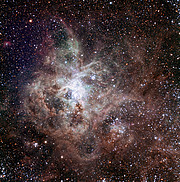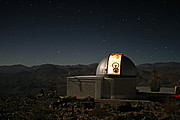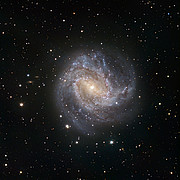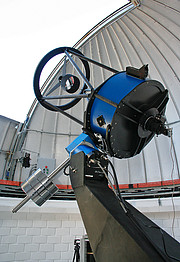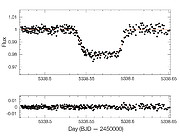Tisková zpráva
Nový teleskop TRAPPIST na observatoři La Silla
bude hlídat oblohu, objevovat exoplanety a studovat komety
8. června 2010
Na primární zrcadlo nového robotického teleskopu TRAPPIST na observatoři La Silla v Chile dopadlo první světlo. Jméno dalekohledu je akronymem plného názvu přístroje „TRAnsiting Planets and PlanetesImals Small Telescope“ a prozrazuje, že teleskop je určen především ke studiu planetárních soustav, a to hned dvěma způsoby. Jednak hledáním a studiem vlastností exoplanet, a také komet v naší Sluneční soustavě. Dalekohled o průměru 60 cm bude řízen z 12 000 km vzdáleného Liège v Belgii.
„Dvojice hlavních úkolů projektu TRAPPIST patří do okruhu zájmu rychle se rozvíjejícího vědního oboru známého jako astrobiologie, který má za cíl studovat původ a rozšíření života ve vesmíru,“ vysvětluje Michaël Gillon, vedoucí exoplanetární části projektu.
„Terestrické Zemi podobné exoplanety představují při hledání života mimo Sluneční soustavu jasný cíl. Na druhé straně se předpokládá, že velmi důležitou úlohu při vzniku a vývoji života na naší planetě hrály komety,“ dodává jeho kolega Emmanuël Jehin, který je zodpovědný za kometární část projektu.
TRAPPIST bude pomocí přesných fotometrických měření hledat malé poklesy jasnosti hvězd, které by mohly být způsobeny přechodem exoplanety přes disk mateřské hvězdy. Při takovém úkazu exoplaneta odstíní část světla hvězdy a pokles jasnosti je tím větší, čím větší je planeta. [1]
„Observatoř ESO La Silla na okraji pouště Atacama patří jistě k nejlepším astronomickým pozorovacím stanovištím na světě,“ říká Gillon. „A jelikož La Silla v současnosti hostí dvojicí výkonných ‚lovců exoplanet‘, nemohli jsme pro náš robotický dalekohled najít lepší místo“.
Astronomové stojící za projektem TRAPPIST budou velmi blízce spolupracovat s týmy využívajícími spektrograf HARPS na dalekohledu o průměru 3,6 m a přistroj CORALIE na švýcarském dalekohledu Leonharda Eulera o průměru 1,2 m (oba pracují na observatoři La Silla). Projekt TRAPPIST vznikl ve spolupráci University Liège a Ženevské observatoře (Švýcarsko). Dalekohled je instalován v budově, která dříve hostila starý švýcarský teleskop T70. Díky této spolupráci probíhají činnosti v rámci projektu velmi rychle; od rozhodnutí o realizaci uplynuly jen dva roky a na zrcadlo nového dalekohledu již dopadlo první světlo.
Dalekohled TRAPPIST bude využíván také ke studiu komet na jižní obloze. Za tímto účelem jsou kamery dalekohledu vybaveny speciálními, vysoce kvalitními filtry, které astronomům umožní pravidelně a detailně sledovat množství různých typů molekul uvolňovaných kometárními jádry při přiblížení ke Slunci.
„Se spoustou komet pozorovatelných každý rok budeme mít brzy k dispozici unikátní vzorek dat, který nám poskytne důležité informace o jejich původu,“ říká Jehin.
TRAPPIST je lehký plně automatický dalekohled o průměru 60 cm, schopný přesného a rychlého navádění kamkoliv na obloze. Pozorování jsou připravována předem a dalekohled vykonává celonoční práci bez další obsluhy. Počasí na stanovišti monitoruje meteorologická stanice, která rozhoduje o uzavření pozorovatelny, pokud je to nutné.
Poznámky
[1] Přechod planety (tranzit) nastává v okamžiku, kdy jedno kosmické těleso (planeta) přechází před jiným (hvězda) a odstiňuje část jeho světla. Tento typ „zatmění“ způsobuje malou měřitelnou změnu jasnosti hvězdy a umožňuje určit mimo jiné průměr planety. V kombinaci s měřením radiálních rychlostí (která provádí spektrograf HARPS) je možné odvodit hmotnost planety a na základě těchto údajů i její hustotu.
Další informace
TRAPPIST (TRAnsiting Planets and PlanetesImals Small Telescope) je projekt Oddělení astrofyziky, geofyziky a oceánografie Univerzity Liège (Belgie) [Department of Astrophysics, Geophysics and Oceanography (AGO), University of Liège (Belgium)] v blízké spolupráci s Ženevskou observatoří ve Švýcarsku [Observatory of Geneva]. Projekt je z větší části financován Belgickým fondem pro vědecký výzkum [Belgian Fund for Scientific Research (FNRS)] za přispění Švýcarské národní vědecké nadace [Swiss National Science Foundation (SNF)].
Složení týmu: Emmanuël Jehin, Michaël Gillon, Pierre Magain, Virginie Chantry, Jean Manfroid a Damien Hutsemékers (University of Liège, Belgium); Didier Queloz a Stéphane Udry (Observatory of Geneva, Switzerland).
Jméno TRAPPIST bylo zvoleno proto, aby podtrhlo belgický původ projektu. Piva Trappist jsou známa po celém světě a většina z nich má také belgický původ. Navíc i členové týmu je dokáží ocenit.
Odkazy
Kontakty
Emmanuël Jehin
University of Liège
Liège, Belgium
Tel.: +32 4 366 97 26
Email: ejehin@ulg.ac.be
Didier Queloz
Geneva Observatory, University of Geneva
Geneva, Switzerland
Tel.: +41 22 379 2477
Email: didier.queloz@unige.ch
Henri Boffin
ESO, La Silla Paranal and E-ELT Press Officer
Garching, Germany
Tel.: +49 89 3200 6222
Mobil: +49 174 515 43 24
Email: hboffin@eso.org
Michaël Gillon
University of Liège
Liège, Belgium
Tel.: +32 4 366 97 43
Email: michael.gillon@ulg.ac.be
Pierre Magain
University of Liège
Liège, Belgium
Tel.: +32 4 366 97 43
Email: pierre.magain@ulg.ac.be
Anežka Srbljanović (press contact Česko)
ESO Science Outreach Network
a Astronomical Institute of Czech Academy of Sciences
Tel.: +420 323 620 116
Email: eson-czech@eso.org
O zprávě
| Tiskové zpráva č.: | eso1023cs |
| Jméno: | 30 Doradus, NGC 2070, Tarantula Nebula |
| Typ: | Local Universe : Nebula : Appearance : Emission : H II Region |
| Facility: | TRAnsiting Planets and PlanetesImals Small Telescope–South |
Our use of Cookies
We use cookies that are essential for accessing our websites and using our services. We also use cookies to analyse, measure and improve our websites’ performance, to enable content sharing via social media and to display media content hosted on third-party platforms.
ESO Cookies Policy
The European Organisation for Astronomical Research in the Southern Hemisphere (ESO) is the pre-eminent intergovernmental science and technology organisation in astronomy. It carries out an ambitious programme focused on the design, construction and operation of powerful ground-based observing facilities for astronomy.
This Cookies Policy is intended to provide clarity by outlining the cookies used on the ESO public websites, their functions, the options you have for controlling them, and the ways you can contact us for additional details.
What are cookies?
Cookies are small pieces of data stored on your device by websites you visit. They serve various purposes, such as remembering login credentials and preferences and enhance your browsing experience.
Categories of cookies we use
Essential cookies (always active): These cookies are strictly necessary for the proper functioning of our website. Without these cookies, the website cannot operate correctly, and certain services, such as logging in or accessing secure areas, may not be available; because they are essential for the website’s operation, they cannot be disabled.
Functional Cookies: These cookies enhance your browsing experience by enabling additional features and personalization, such as remembering your preferences and settings. While not strictly necessary for the website to function, they improve usability and convenience; these cookies are only placed if you provide your consent.
Analytics cookies: These cookies collect information about how visitors interact with our website, such as which pages are visited most often and how users navigate the site. This data helps us improve website performance, optimize content, and enhance the user experience; these cookies are only placed if you provide your consent. We use the following analytics cookies.
Matomo Cookies:
This website uses Matomo (formerly Piwik), an open source software which enables the statistical analysis of website visits. Matomo uses cookies (text files) which are saved on your computer and which allow us to analyze how you use our website. The website user information generated by the cookies will only be saved on the servers of our IT Department. We use this information to analyze www.eso.org visits and to prepare reports on website activities. These data will not be disclosed to third parties.
On behalf of ESO, Matomo will use this information for the purpose of evaluating your use of the website, compiling reports on website activity and providing other services relating to website activity and internet usage.
Matomo cookies settings:
Additional Third-party cookies on ESO websites: some of our pages display content from external providers, e.g. YouTube.
Such third-party services are outside of ESO control and may, at any time, change their terms of service, use of cookies, etc.
YouTube: Some videos on the ESO website are embedded from ESO’s official YouTube channel. We have enabled YouTube’s privacy-enhanced mode, meaning that no cookies are set unless the user actively clicks on the video to play it. Additionally, in this mode, YouTube does not store any personally identifiable cookie data for embedded video playbacks. For more details, please refer to YouTube’s embedding videos information page.
Cookies can also be classified based on the following elements.
Regarding the domain, there are:
- First-party cookies, set by the website you are currently visiting. They are stored by the same domain that you are browsing and are used to enhance your experience on that site;
- Third-party cookies, set by a domain other than the one you are currently visiting.
As for their duration, cookies can be:
- Browser-session cookies, which are deleted when the user closes the browser;
- Stored cookies, which stay on the user's device for a predetermined period of time.
How to manage cookies
Cookie settings: You can modify your cookie choices for the ESO webpages at any time by clicking on the link Cookie settings at the bottom of any page.
In your browser: If you wish to delete cookies or instruct your browser to delete or block cookies by default, please visit the help pages of your browser:
Please be aware that if you delete or decline cookies, certain functionalities of our website may be not be available and your browsing experience may be affected.
You can set most browsers to prevent any cookies being placed on your device, but you may then have to manually adjust some preferences every time you visit a site/page. And some services and functionalities may not work properly at all (e.g. profile logging-in, shop check out).
Updates to the ESO Cookies Policy
The ESO Cookies Policy may be subject to future updates, which will be made available on this page.
Additional information
For any queries related to cookies, please contact: pdprATesoDOTorg.
As ESO public webpages are managed by our Department of Communication, your questions will be dealt with the support of the said Department.

